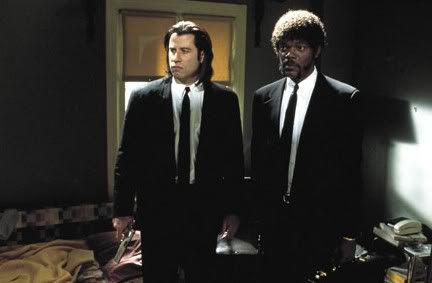Marupok. Third class.
"Bayaning 3rd World", in a nutshell, tackles the grave dissonance that besets two filmmakers about whether or not a Jose Rizal movie is really worth making. Is Rizal really national hero-worthy, or is the much-talked about 'retraction' letter that he has supposedly written and signed before his execution enough to dethrone him of the honor? Eclectic Filipino filmmaker Mike De Leon, whose works range from the disturbing family drama "Kisapmata" to the outrageous "Kakakabakaba Ka Ba?" is the only one audacious enough to examine the Rizal myth with a sort of satirical glee. Originally, he is slated to direct a Rizal film starring Aga Muhlach, but when the project fell through, perhaps it dawned on him that a romanticized Rizal film is not what the country needs. Perhaps that episode of contemplation may have resulted to this. As what George R.R. Martin has once written (another instance when I'm quoting a famous literary figure just to sound smart): "Life is not a song, sweetling."
Reminiscent of how Orson Welles has, step-by-step, investigated the reason behind Charles Foster Kane's utterance of 'Rosebud' in "Citizen Kane", "Bayaning 3rd World" pushes aside all the nationalistic clichés that ornament Rizal's life to arrive at the very root of its own inquisition: Does Jose Rizal really deserve the endless veneration and, to a lesser extent, the immortalization of his mug in all those one-peso coins? Ricky Davao and Cris Villanueva, portraying the two filmmakers hungry for truth, further investigate, and the result is the kind that opens eyes.
Styled in a way that's very self-referential and postmodernistic, "Bayaning 3rd World" is equal parts emotional and comedic. From Rizal's mild-mannered brother Paciano (Joonee Gamboa) to his flame Josephine Bracken herself (Lara Fabregas), every character in Rizal's briefer than brief life had their say, in a series of loose faux interviews, about the national hero's ambiguous psychology and also about the controversial retraction letter, and whether there is indeed a possibility that Rizal has written and signed it himself, and sincerely at that, without the nefarious goading of several friars.
The script (co-written by De Leon and Doy Del Mundo), on the other hand, is deliciously balanced both as a fairly radical comedy and as an involving period piece, which prevents the film from being overly ridiculous in its humor or being overly stern in its drama. While the accompanying performance by Joel Torre, who plays the said national hero in the film, exudes the needed vibrancy, insecurity and emotional torment to successfully pull off a memorable Rizal performance. Jose Rizal, after all, is a very flawed hero, but is that such a bad thing?
In a way, as much as the film is a deeply investigative albeit playful exploration of Rizal's heroism, it also digs deep on our very own nationalistic consciousness, or on whatever's left of it, and makes us confront Jose Rizal in the same way how we may look at our own selves in the mirror to see all the grimy imperfections. I doubt that we can do the same after watching Marilou Diaz-Abaya's very polished but ultimately too safe "Jose Rizal" or Tikoy Aguiluz's too detached "Rizal sa Dapitan".
With "Bayaning 3rd World's" unexpectedly incisive attempt at honesty, I doubt that the people who have seen the film may look at Jose Rizal the same way again; that is, as a perfect Malayan who has done nothing worthy of reproach. The film may not be as big and sprawling as "Jose Rizal" or as picturesque and romantic as "Rizal sa Dapitan", but its uncommon stylistic approach and fascinating dissection of history are what make it very special. It's a film that's brave enough to question Rizal's heroism but is also assured enough to let us, the Filipino viewers who have forever lived in the shadows of his martyrdom, ultimately decide for ourselves on how we may see him. The film is, quite simply, a strange love letter to the life, love and heroism of Jose Rizal, but with a postscript that asks a pointed question or two.
FINAL RATING











